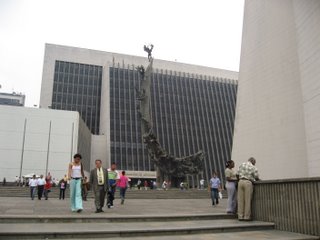Wednesday: Night and Day
If yesterday’s meetings provided differing views on the Colombian conflict, the two talks today were even more dramatic in their contrasts.

Early in the morning we flew from Apartadó to Medellín and proceeded to a meeting with the government of the department of Antioquia. We met with the Secretary of Government Jorge Mejía Martínez and Human Rights director Rocío Pineda. Antioquia’s government is allied with conservative president Alvaro Uribe, and they shared his negative views on the San Jose peace community. Mejía said that they want to open up communication with the community, but it has been very difficult because they isolate themselves. He said he respected their choice not to use governmental services (such as the school in the town of San Jose), but that it was an irrational decision. He justified the presence of police in the community because it has led to a drop in violence. More communities request police then they are able to provide, so San Jose should feel privileged to have the police station. Furthermore, Pineda added, there is no longer a need to engage in armed struggle as evidenced by ex-guerrillas capturing the mayoral post in Bogota and the governorship of Valle. People support Uribe because he has fulfilled his promises to rid the country of guerillas, even if it has meant sacrificing liberties. She emphasized that war has passed through Antioquia, and now peace is taking hold here.
The meeting in the afternoon with three human rights lawyers could not have been more different. While the governmental human rights director seemed to be positioned to whitewash the crimes of the paramilitary violence, this group strongly criticized the Peace and Justice Law which demobilizes paramilitaries and provides them with political rights. The lawyers denounced it as an impunity law that ignores the rights of victims and provides no mechanisms for reparations or confessions. Leaders only acknowledge acts of complicity by soldiers who are already dead, and continue to maintain that their victims were guerrillas. The demobilization is a sham; the structures are the same but only the name of the organization has changed to Aguilas Negras. In contrast, the lawyers have launched a campaign to accompany victims of the violence and to bring truth to light. They call their campaign “Memories against silence and impunity: Never again crimes of the state.” Extrajudicial executions by the military continue, and claims that they have stopped are not credible. These lawyers see the military’s human rights language as pure rhetoric, nothing more. It is a lie that there are no more paramilitaries. Furthermore, in contrast to the contention of the governmental human rights officer a drop in homicides is not due to a police presence, but when the paramilitary gain hegemony they commit fewer crimes in order to project an image of peace and harmony.
Early in the morning we flew from Apartadó to Medellín and proceeded to a meeting with the government of the department of Antioquia. We met with the Secretary of Government Jorge Mejía Martínez and Human Rights director Rocío Pineda. Antioquia’s government is allied with conservative president Alvaro Uribe, and they shared his negative views on the San Jose peace community. Mejía said that they want to open up communication with the community, but it has been very difficult because they isolate themselves. He said he respected their choice not to use governmental services (such as the school in the town of San Jose), but that it was an irrational decision. He justified the presence of police in the community because it has led to a drop in violence. More communities request police then they are able to provide, so San Jose should feel privileged to have the police station. Furthermore, Pineda added, there is no longer a need to engage in armed struggle as evidenced by ex-guerrillas capturing the mayoral post in Bogota and the governorship of Valle. People support Uribe because he has fulfilled his promises to rid the country of guerillas, even if it has meant sacrificing liberties. She emphasized that war has passed through Antioquia, and now peace is taking hold here.
The meeting in the afternoon with three human rights lawyers could not have been more different. While the governmental human rights director seemed to be positioned to whitewash the crimes of the paramilitary violence, this group strongly criticized the Peace and Justice Law which demobilizes paramilitaries and provides them with political rights. The lawyers denounced it as an impunity law that ignores the rights of victims and provides no mechanisms for reparations or confessions. Leaders only acknowledge acts of complicity by soldiers who are already dead, and continue to maintain that their victims were guerrillas. The demobilization is a sham; the structures are the same but only the name of the organization has changed to Aguilas Negras. In contrast, the lawyers have launched a campaign to accompany victims of the violence and to bring truth to light. They call their campaign “Memories against silence and impunity: Never again crimes of the state.” Extrajudicial executions by the military continue, and claims that they have stopped are not credible. These lawyers see the military’s human rights language as pure rhetoric, nothing more. It is a lie that there are no more paramilitaries. Furthermore, in contrast to the contention of the governmental human rights officer a drop in homicides is not due to a police presence, but when the paramilitary gain hegemony they commit fewer crimes in order to project an image of peace and harmony.

